Shoulder Arthritis — Shoulder Joint Replacement: treatment in the Best Hospitals of Germany
Treatment prices are regulated by national law of the corresponding countries, but can also include additional hospital coefficients. In order to receive the individual cost calculation, please send us the request and medical records.
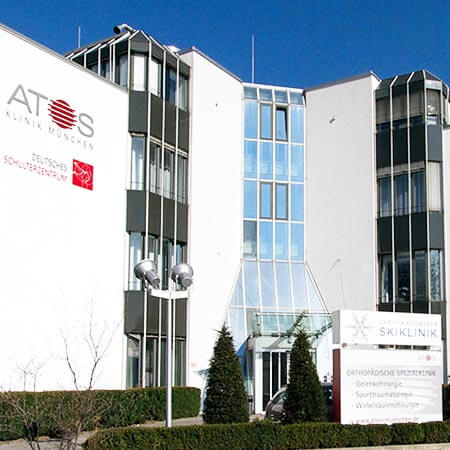
Department of Orthopedics, Foot Surgery, Hand Surgery and Spinal Surgery
According to the prestigious medical magazine Focus, the Department of Orthopedics, Foot Surgery, Hand Surgery and Spinal Surgery is one of the best medical facilities in Germany, specializing in shoulder and knee surgery, foot surgery, and hand surgery! The department offers a full range of medical services for diseases of the musculoskeletal system. The key focus of the department's doctors is the treatment of diseases of the large joints: knee, hip, shoulder, elbow, ankle, and wrist. Foot surgery specialists are responsible for the correction of hallux valgus, hallux rigidus, clubfoot, flatfoot, and claw toes, as well as the treatment of ankle arthrosis, heel spurs, and Achilles tendon ruptures. The department regularly admits patients with hand diseases, with particular interest in the treatment of wrist arthrosis, rhizarthrosis, carpal tunnel syndrome, and Dupuytren's contracture. The therapeutic offer is complemented by conservative and surgical treatment of spinal diseases such as herniated discs, spinal canal stenosis, vertebral fractures, and others. The department's medical team offers patients effective conservative treatment methods. However, when surgery is required, arthroscopic and minimally invasive techniques are preferred to ensure the fastest possible postoperative recovery and a high level of safety.
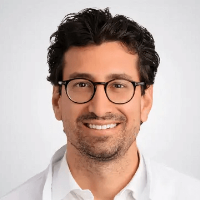

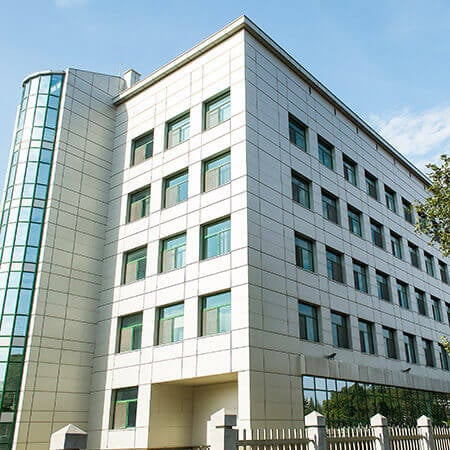
Department of Adult and Pediatric Orthopedics, Trauma Surgery, Foot Surgery, Hand Surgery and Rheumatology
The Department of Adult and Pediatric Orthopedics, Trauma Surgery, Foot Surgery, Hand Surgery and Rheumatology offers the full range of diagnostic and therapeutic services in its areas of specialization. The key areas of work of the department's doctors include large joint arthroplasty, arthroscopic interventions on the knee, hip, and shoulder joints, conservative and surgical treatment of foot and hand diseases and deformities, rheumatic joint lesions, orthopedic diseases in children, and musculoskeletal injuries. The key to successful clinical practice is the professionalism and unique experience of the department's medical team, combined with the advanced infrastructure and state-of-the-art equipment. The department has 5 operating rooms equipped with the latest technology. Most surgical interventions are performed using minimally invasive techniques, due to which, in the shortest possible time, the patient is verticalized, their mobility is restored, and a pronounced pain syndrome is excluded. The department annually performs more than 4,500 surgical interventions, including especially complex ones, so the specialists at the medical facility are rightfully proud of their impressive clinical experience in the surgical treatment of orthopedic diseases. Over the years, the department has gained an excellent reputation not only in Germany but also far beyond its borders.
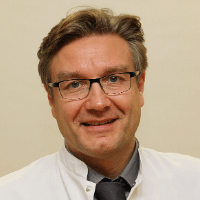

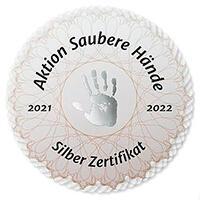
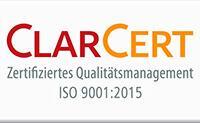

Department of Adult and Pediatric Orthopedics, Traumatology
According to Focus magazine, the University Hospital Heidelberg ranks among the top five hospitals in Germany! The hospital is one of the most advanced and reputable medical institutions not only in Germany, but throughout Europe. There are more than 43 specialized departments and 13 medical institutes, which cover all fields of modern medicine. A distinctive feature of the hospital is the presence of unique therapeutic methods for the treatment of complex and rare clinical cases.






Severe osteoarthritis of the shoulder joint requires surgical treatment. The most effective surgery is shoulder replacement. Thousands of such procedures are performed every year in Germany. German doctors perform both partial and total replacement surgery. This operation gives very successful results. With high-quality treatment and recovery, a person gets rid of pain forever, restores joint mobility and stability, and can return to active life, do physical labor or sports. To travel to Germany for treatment, please use the Booking Health services. On our website, you can compare prices in different hospitals and book a medical care program at an affordable price.
Content
- Who may need shoulder replacement?
- In what cases is replacement surgery for shoulder arthrosis performed?
- Types of shoulder replacement surgery
- Partial shoulder replacement
- Total shoulder replacement
- Surgery outcomes
- Why is it better to undergo shoulder replacement in Germany?
- Treatment in Germany with Booking Health
Who may need shoulder replacement?
Osteoarthritis is one of the main, but far from the only indications for shoulder replacement. If in other diseases the vast majority of replacement surgeries are performed precisely for arthrosis, shoulder replacement in a significant number of cases is carried out in the following cases:
- Severe injuries.
- Post-traumatic deformities.
- Damage to the tendons of the shoulder rotator cuff muscles.
- Cancers.
- Rheumatic pathologies.
Most joints are replaced in elderly patients. For example, the average age of patients who undergo hip replacement is 75 years, but the shoulder often has to be replaced even in young patients, since the main reason for its significant damage can be one-time severe injuries or repeated microtraumas. It is not uncommon for shoulder replacement to be performed before the age of 30. Two-thirds of patients are under 60 years at the time of surgery.
Since most of the surgical procedures are performed in people of working age, it is extremely important to completely get rid of pain and restore limb function. This requires several conditions: high-quality prosthesis, its high-quality implantation, experienced doctors and a well-equipped hospital. All this is available in Germany. The vast majority of operations in this country are successful, without complications and with long-term results.
In what cases is replacement surgery for shoulder arthrosis performed?
The specificity of shoulder arthrosis is that in most cases it is secondary. This means that it develops due to another disease. This pathology is significantly different from the lesions of other joints. Most of the replacement surgeries are performed for hip and knee arthrosis, which is primary in most patients.
Primary arthrosis develops due to the fact that the joint wears out with age, but in the case of the shoulder, this usually does not happen. The shoulder joint does not take on body weight. The load on it is not as significant as on the lower limb. For this reason, shoulder arthrosis is much less common and usually has particular causes. Shoulder replacement surgeries are not as common as major joint replacement surgeries in the legs.
The main types of shoulder arthrosis by origin are:
- Primary.
- Secondary.
In turn, the primary one can be:
- Involutive – the result of aging of the body (very rare).
- Microtraumatic – occurs due to heavy physical labor, as a result of the constant load on the shoulder, and repeated microtraumas.
Secondary arthrosis can be divided into the following types:
- Post-traumatic – develops as a consequence of a one-time severe injury.
- Post-infectious – the result of shoulder inflammation.
- Arthrosis caused by systemic diseases.
- Dystrophy of the humeral head, which develops as a result of long-term shoulder instability.
Replacement surgery is not considered the first-line therapy for the treatment of arthrosis. If with affected joints of the legs, osteoarthritis inevitably progresses, then with the shoulder lesions, the development of pathology often does not occur or the progression is very slow. In many cases, it is possible to treat the disease using conservative methods. Doctors use painkillers, orthoses, therapeutic exercises, physiotherapy, platelet-rich plasma or stem cell injections into the joint.
If surgery is required, good results can often be achieved with arthroscopic procedures. The doctors wash the shoulder joint cavity, remove bone and cartilaginous growths, freely located cartilage flaps. Sometimes the inflamed synovium can be resected.
The medical specialists resort to shoulder replacement only in cases where pathological changes in the joint become significant, the pain increases, and other treatment methods do not provide a sufficient effect. This operation is the most traumatic and requires a long recovery. At the same time, it is also the most effective. Unlike other techniques, shoulder replacement restores the patient's quality of life to the level it was before the onset of the disease.
The most severe form of pathology is post-traumatic arthrosis. As a result of injury, severe deformations occur, scars and contractures appear. The disease is often accompanied by neurological disorders, since 12% of patients damage the axillary nerve during the injury. Nonetheless, even in the most complex cases, German specialists manage to perform a successful surgical procedure and provide the patient with freedom of movements without pain.
Types of shoulder replacement surgery
The shoulder joint consists of two components: the femoral head, which rotates in the glenoid cavity of the scapula. During the operation, doctors can replace only one or both of these components at once.
Partial shoulder replacement (hemiarthroplasty) – replacement of only the shoulder component of the joint. The doctor removes the humeral head, replacing it with a prosthesis made of artificial materials. It rotates in the patient's own glenoid cavity.
Partial shoulder replacement has the following benefits:
- Less traumatic surgery.
- Fast recovery.
- Minimal health risks.
- Endoprosthesis wears out more slowly even under high load.
- Lower cost of treatment.
Total shoulder replacement (total arthroplasty) – it is a more extensive and technically complex operation. It is performed for severe osteoarthritis. In general, total arthroplasty in replacement surgery is used more often than partial. Total shoulder replacement has the following advantages:
- Better functional results (greater range of motion in the shoulder).
- Complete absence of pain.
- Possibility of treatment even for the most severe shoulder diseases.
By the type of total endoprosthesis used, anatomical and reverse replacement surgeries are distinguished.
Anatomical replacement surgery is a standard option for this operation. These types of prostheses are implanted in 90% of patients. The femoral head looks like a ball. It is in contact with the flat surface of the scapular portion of the endoprosthesis. Namely, the configuration is exactly the same as in the patient's own shoulder.
Reverse replacement surgery involves the use of a type of the prosthesis with a reverse ball and a flat surface. The ball-shaped part is implanted in the scapula, and the flat part – in the humerus. This is necessary to compensate for the function of the damaged muscles of the rotator cuff of the shoulder. After the operation for reverse replacement surgery, the shoulder rotates mainly due to the contraction of the deltoid muscle, and therefore the function of this muscle must be completely preserved for a good functional outcome. Only 10% of patients require the use of reverse endoprostheses. Although the rotator cuff tendons are often damaged, they can be repaired in most cases. Reverse replacement surgery is indicated only for irreparable tendon tears.
According to the number of operations performed, replacement surgery can be primary and revision.
Primary interventions are those performed for the first time. During the operation, the doctor removes the patient's own joint and implants an endoprosthesis in its place.
Revision operation is repeated. It is performed with a previously implanted endoprosthesis. The reason for revision intervention is usually loosening of the endoprosthesis or infectious complications.
Partial shoulder replacement
Partial replacement surgery is historically the first shoulder replacement surgery. It involves replacing only one of the two components of the joint – humeral head. In about 4 out of 10 patients, doctors perform partial replacement surgery.
Whenever possible, this is the first-line treatment option. This is especially true for young patients who are going to do sports or physical labor. The probability of wear and tear of the prosthesis is lower than after total replacement.
However, not all of them can be fulfilled. The basic conditions and indications for partial replacement surgery include:
- Preserved cartilaginous part of the scapula – it must reliably hold the artificial humeral head in the glenoid cavity.
- Previous infectious arthritis.
- Humeral head displaced upward.
Partial replacement is preferable in case of scapula bone tissue deficiency. In this case, problems may arise with fixing the scapular part of the endoprosthesis.
Total shoulder replacement
Total shoulder replacement is a technically more complicated operation. It is performed in severe cases of arthrosis. Doctors prefer total shoulder replacement in 6 out of 10 patients.
This surgical procedure is effective even in cases where the shoulder joint is completely destroyed by the pathological process, and the changes extend to the glenoid cavity of the scapula. The advantages of this treatment method include greater arm functionality, muscle strength, and complete absence of pain. In general, the quality of life of patients after total shoulder replacement is higher than after the partial one.
However, the technique also has some disadvantages: the cost of treatment is higher, the operation is more traumatic, and the risk of loosening the endoprosthesis is higher. After total shoulder replacement, the patient is advised to limit the load on the arm. The rapid wear and tear of the artificial joint is possible in high physical activity, as a result of hard work or during sports.
Surgery outcomes
Along with hip and knee replacement surgeries, shoulder replacement is one of the most successful orthopedic operations. It provides excellent functional results both in the immediate and late postoperative period.
Better results can be provided by total shoulder replacement. Patients have greater freedom of movement and are less likely to suffer from pain. In the vast majority of cases, a person does not have even minimal pain, including in a significant load on the operated joint.
The full recovery of shoulder function depends not only on the quality of the surgery, but also on the follow-up rehabilitation. Germany is one of the leaders in the quality of orthopedic rehabilitation of patients. The country has more than 1,500 Rehabilitation Centers. They have modern equipment and qualified specialists. After high -quality rehabilitation, the patient, even with an artificial joint, can withstand any kind of load, do sports or physical labor.
With the use of high-quality endoprostheses, the long-term results are often even better than in replacement of the joints of the lower limbs. There is no such heavy load on the shoulder as on the legs. This joint is very mobile, but it does not need to carry the weight of a person's body. An artificial shoulder can serve a person for decades. The likelihood that the need for revision surgery will appear during a patient's life is very low.
Why is it better to undergo shoulder replacement in Germany?
Shoulder replacement in Germany is reliable, safe and provides the best functional outcomes. After the surgical treatment in this country, you can undergo a full-fledged orthopedic rehabilitation.
Here are several reasons why you should undergo shoulder replacement in Germany:
- Experienced surgeons with thousands of successful surgeries.
- The very latest types of endoprostheses, which will serve for decades and with a high probability will never need to be replaced.
- Low risk of infectious complications – the most unfavorable ones, requiring revision surgery early after replacement.
- Minimal risk of endoprosthesis loosening, even in regular physical exertion.
- High-quality rehabilitation of patients.
- Complete elimination of pain in 96% of cases.
- Successful operations even in complex cases: in post-traumatic osteoarthritis, shoulder instability, pseudoparalysis, humeral bone deficiency.
Treatment in Germany with Booking Health
To undergo shoulder replacement in Germany, please use the Booking Health services. On our website, you can see the cost of treatment in different German hospitals, compare prices and book a medical program at an affordable price.
Please contact the Booking Health specialists to undergo treatment in Germany. Here are our benefits for you:
- We will choose the best orthopedic hospital whose doctors specialize in shoulder replacement surgery.
- We will help you overcome the language barrier, establish communication with the German hospital and your attending physician.
- We will reduce the waiting time for the medical care program and book a doctor's appointment on the most suitable dates.
- We will reduce the price. The cost of treatment in Germany will be decreased due to the lack of additional coefficients for foreign patients.
- We will take care of all organizational issues: documents for entering the country, transfer from the airport, hotel, interpreter, etc.
- We will elaborate a medical care program and translate medical records into German. You do not have to undergo previously performed diagnostic procedures.
- We will provide communication with the hospital upon the completion of treatment in Germany.
- We will organize additional medical examinations, treatment in Germany or rehabilitation, if necessary.
- We will buy medicines in Germany and forward them to your native country.
- We will help you keep in touch with the hospital after your treatment in Germany.
Booking Health makes treatment in Germany easier, faster and cheaper. We will fully organize your trip, and you will only have to focus on restoring your health.
Authors:
This article was edited by medical experts, board-certified doctors Dr. Nadezhda Ivanisova, and Dr. Bohdan Mykhalniuk. For the treatment of the conditions referred to in the article, you must consult a doctor; the information in the article is not intended for self-medication!
Our editorial policy, which details our commitment to accuracy and transparency, is available here. Click this link to review our policies.

